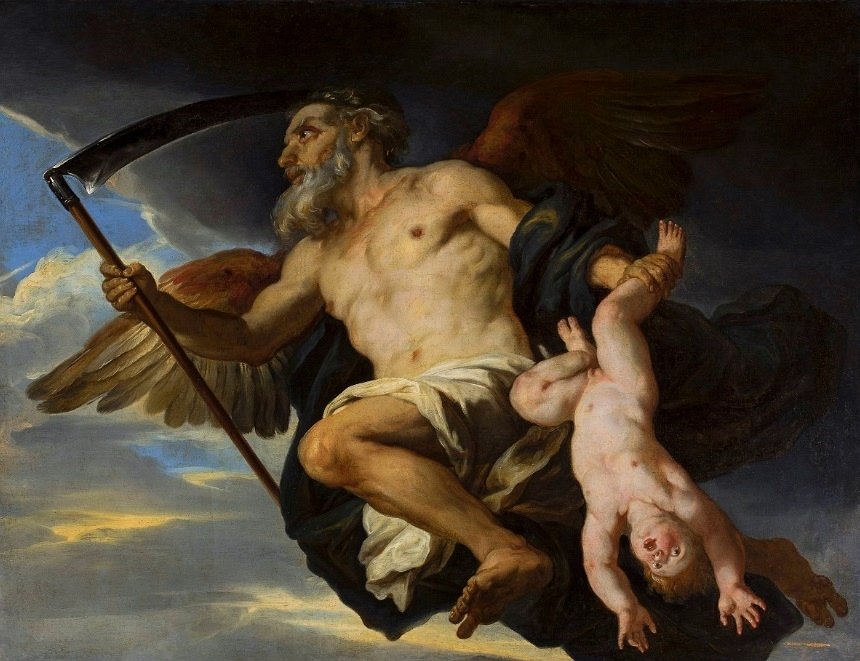The Myth of Zeus and Cronus in Greek Mythology tells the story of how Zeus took control of the universe from Cronus and the Titans. Zeus wasn’t always the head of the gods and goddesses of Mount Olympus, He took control of the universe from his father Cronus. This gives rise to a question. Did Zeus Kill his father?
Zeus defeated the Titans along with Cronus and imprisoned them in Tartarus under the watch of Hades but did not kill them. The story of how Zeus became the primary god of the Greek religion is told in the myth of Zeus and Cronus.
The Beginning of the Myth
Zeus was the son of Cronus, a Titan of the first generation and the youngest son of the primordial deities Uranus and Gaia. In the era known as the Golden Age of Greek mythology, Cronus successfully overthrew his father, Uranus, to become the ruler of the gods.

Uranus harbored resentment towards his offspring, driven by envy for the affection Gaia showered upon them. This jealousy translated into oppressive rule, leading him to imprison his own children in Tartarus, the underworld. Among the children, it was Cronus who dared to confront Uranus’ oppression. Armed with a massive flint weapon bestowed by Gaia, he castrated his father, an act that also brought forth the birth of Aphrodite.
Cronus’s relationship with his own children was strained due to a prophecy he received before their birth. Informed by his parents, Gaia and Uranus, that he would eventually be overthrown by one of his own offspring, Cronus resorted to extreme measures. He swallowed each of his children whole to forestall their potential uprising.
Yet, Zeus evaded this fate, thanks to Rhea’s cunning strategy. She managed to deceive Cronus into swallowing a rock instead of Zeus. Rhea then concealed Zeus in a cavern on the island of Crete, where he was nurtured by a nymph named Cynosura. Essentially, Cronus’s fear of being supplanted by his progeny led to these desperate actions.
Zeus Frees His Siblings
Upon learning of his siblings’ plight, Zeus recognized the imperative to take action. He realized that aligning with his siblings was crucial to overthrowing the Titans and assuming control. Understanding the necessity to halt his father Cronus, Zeus devised a plan to reclaim his kin.
Zeus orchestrated the return of his siblings by offering Cronus a drink of mead infused with a potent drug. This concoction induced Cronus to vomit everything he had ingested, including the stone that had been ingested instead of Zeus. In a series of upheavals, the stone and then all five of his siblings were successfully liberated from Cronus’s grasp.
Who Were Zeus’s Siblings?
The five siblings of Zeus were Hades, Poseidon, Hestia, Hera, and Demeter. According to some myths, he also had a half-brother, Chiron.
Hades: The sovereign of the underworld and the divine figure of the afterlife, Hades assumed the role of both King of the deceased and guardian of proper funeral rituals.
Poseidon: A quick-tempered deity, Poseidon held dominion over the vast seas. His authority extended to causing earthquakes and his creative prowess was tied to the conception of horses. Possessing a fiery temperament, Poseidon frequently engaged in disputes with both divine and mortal entities, including notable conflicts with Athena and Odysseus.
Hera: Among the Olympian pantheon, Hera occupied the throne of the gods as the queen. Her divine purview included marriage, women, the celestial expanse of the sky, and the stars that adorned it.
Hestia: Hestia, the goddess presiding over the hearth and the haven of home, played a pivotal role in domestic life. As the guardian of the hearth’s flame, she also oversaw the sacred fires of altars and the communal feasts linked to them.
Demeter: Demeter was a prominent Olympian goddess of agriculture, grain cultivation, and the sustenance of humankind through the earth’s abundant yield. Recognized as the mother of Persephone, Demeter also held a position of prominence in the Mystery Cults of Ancient Greece.
How Did Zeus Defeat His Father?
Cronus and Rhea held the esteemed titles of King and Queen within the Titan dynasty. Upon Zeus’s reunion with his siblings, a shared understanding emerged that Zeus was the rightful ruler, and they collectively resolved to contest supremacy among the gods. This marked the beginning of the Titanomachy or the War of the Titans, a conflict meticulously orchestrated by Zeus, who had grown up in the confines of the Cretan cave under the nurturing guidance of the nymph.
Zeus’s ambitions transcended the mere freedom of his siblings; he harbored a profound aspiration to take control of the world from the Titans’ grip. The ensuing battle was protracted, perilous, and marked by untold bloodshed. In the end, it was the Olympian deities who emerged as the triumphant forces. The Titans were confined within the depths of Tartarus, under the watchful gaze of Hades, while the Hekatonkheires assumed the role of sentinels, guarding over them.
Conclusion
Zeus ascended to a position of unparalleled power. Not only did he become the paramount ruler of all divine beings, but he also possessed the authority to mete out punishment when necessary. This dominion over natural forces was notably maintained with the help of a weapon, the thunderbolt, synonymous with his ability to manipulate the weather, often with catastrophic consequences.
Due to his mastery over the potentially devastating forces of nature, Zeus commanded profound reverence and fear from both the Ancient Greeks and his fellow gods and goddesses, instilling a sense of fear in those who dared to cross his path.
Also Read: Theseus and Minotaur: A Tale of Courage and Heroism
